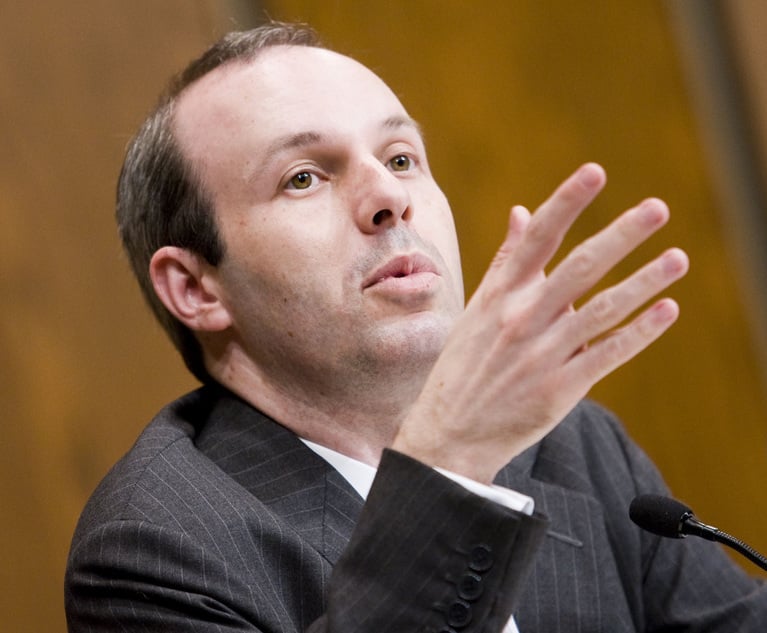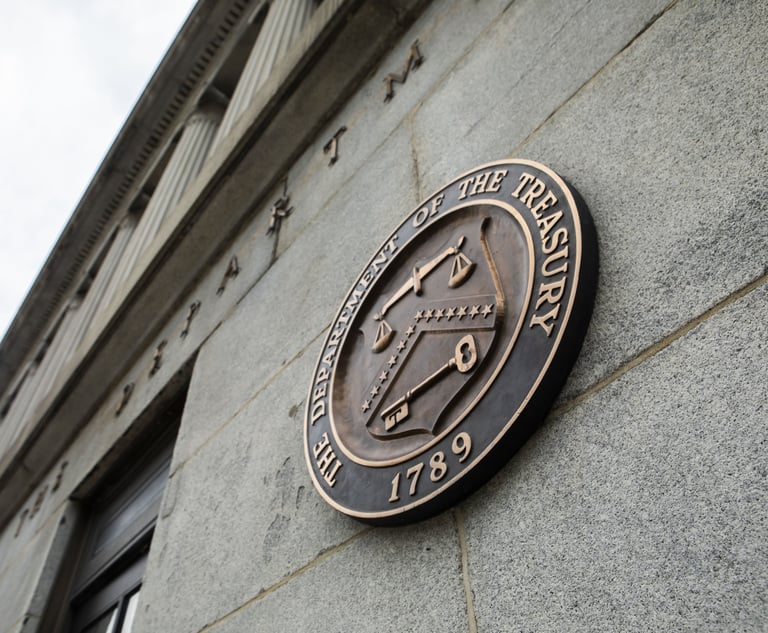High Court Weighs In On Auto Dialer Definition Under TCPA in 'Facebook v. Duguid'
While this decision will eliminate TCPA litigation based on claims that the call or text was made from a device that had the mere "capacity" to store numbers to be called and to dial such numbers automatically, it will not eliminate all TCPA litigation.
June 14, 2021 at 09:35 AM
5 minute read
 Samantha Duke of RumbergerKirk. Courtesy photo
Samantha Duke of RumbergerKirk. Courtesy photo Recently, in a win to many businesses and defendants, the U.S. Supreme Court ruled in Facebook v. Duguid, that to qualify as an automatic telephone dialing system (ATDS) or auto dialer under the Telephone Consumer Protection Act (TCPA), the device must have the capacity to either store the telephone number using a random or sequential number generator or produce a telephone number using a random or sequential number generator.
While this decision will eliminate TCPA litigation based on claims that the call or text was made from a device that had the mere "capacity" to store numbers to be called and to dial such numbers automatically, it will not eliminate all TCPA litigation. Below are some key takeaways businesses and defense attorneys should consider post-Duguid.
- The Duguid opinion does not apply to all TCPA cases. This decision does not impact the TCPA's automated calling restrictions with respect to artificial voices or prerecorded voice messages (i.e., interactive voice response, ringless voicemail or voicemail drops, and artificial intelligence messages). The Duguid decision also does not impact other requirements of the TCPA, such as the Do Not Call rules that do not depend on the type of technology used to make the call.
- The Supreme Court offers no practical guidance on the technical requirements of an auto dialer, likely resulting in a battle of the experts in litigation. While the Duguid court clarified the definition of "auto dialer," it left open the question of what devices would actually meet this definition. For example, in footnote 7, the court stated: "For instance, an auto dialer might use a random number generator to determine the order in which to pick phone numbers from a pre-produced list. It would then store those numbers to be dialed at a later time." Attorneys and district courts are still left to the practical application of this definition to the actual devices at issue.
- The decision also does not clarify the use versus capacity debate. It remains an open question of whether the device at issue must actually use a random or sequential number generator in order to constitute an "auto dialer," or whether the device only has to have the capacity to use a random or sequential number generator. Compare "to qualify as an [ATDS] under the TCPA, a device must have the capacity …" with a later statement of the court that "Congress' definition of an auto dialer requires … the equipment in question must use a random or sequential number generator." This issue will remain one to be litigated in the lower courts.
- The role of human intervention is unclear. Long-standing FCC authority finds the "basic function" of an ATDS is to dial numbers "without human intervention." See Rules and Regulations Implementing the Telephone Consumer Protection Act, CG Docket No. 02-278, Report and Order, 18 FCC Rcd 14014, para 132 (2003). A common defense has been that even if the messaging platform can store and/or produce numbers using a random or sequential number generator, if those messages were sent with sufficient human interaction, then there is no liability under the TCPA. Yet, in footnote 6, the court appears to eliminate the "human intervention" defense by stating in response to a defense offered by Duguid, that "all devices require some human intervention, whether it takes the form of programming a cell phone to respond automatically to texts received while in 'do not disturb' mode or commanding a computer program to produce and dial phone numbers at random. We decline to interpret the TCPA as requiring such a difficult line-drawing exercise around how much automation is too much." Thus, the "human intervention" defense appears to be on shaky legs following this opinion.
- Should text messages be considered "calls" under the TCPA? The court expressly declined to decide whether text messages should be covered under the TCPA. However, in oral argument, Justice Clarence Thomas questioned the ATDS provision's applicability to text messages. And the decision in fact focuses on the purpose of the ATDS provision in covering "unique" and "senescent" technology that existed at the time of the TCPA's enactment— which would not include text messages.
- Congress may act in response. Following the Duguid opinion, some members of Congress expressed their displeasure with the opinion and vowed to "make right what the Supreme Court got wrong." Legislation to reform the TCPA to allow for additional consumer protections may be introduced and may receive enough support under the current Biden administration.
- Potential FCC action? Since the U.S. Court of Appeals for the D.C. Circuit's reversal of the FCC's declaratory order in which the FCC clarified that "capacity" under the TCPA meant potential capacity, the FCC has remained silent on its interpretation of ATDS. The FCC might consider further guidance following Duguid and attempt to clarify its position, however, the FCC is currently one commissioner short and lacks a permanent chairperson that could delay any guidance on this issue.
While the Duguid opinion provides welcome relief to many businesses being sued in TCPA litigation, companies should still remain attentive and cautious, and monitor compliance with the TCPA. As always, proper consent under the TCPA is still primary and can avoid or substantially mitigate ATDS issues.
This content has been archived. It is available through our partners, LexisNexis® and Bloomberg Law.
To view this content, please continue to their sites.
Not a Lexis Subscriber?
Subscribe Now
Not a Bloomberg Law Subscriber?
Subscribe Now
NOT FOR REPRINT
© 2025 ALM Global, LLC, All Rights Reserved. Request academic re-use from www.copyright.com. All other uses, submit a request to [email protected]. For more information visit Asset & Logo Licensing.
You Might Like
View All
22-Count Indictment Is Just the Start of SCOTUSBlog Atty's Legal Problems, Experts Say
5 minute read
Supreme Court Wrestles With Disabled Ex-Firefighter's Discrimination Case

Corporate Disclosure Law Enjoys ‘Presumption of Constitutionality,’ Feds Tell Justices

Trending Stories
- 1Uber Files RICO Suit Against Plaintiff-Side Firms Alleging Fraudulent Injury Claims
- 2The Law Firm Disrupted: Scrutinizing the Elephant More Than the Mouse
- 3Inherent Diminished Value Damages Unavailable to 3rd-Party Claimants, Court Says
- 4Pa. Defense Firm Sued by Client Over Ex-Eagles Player's $43.5M Med Mal Win
- 5Losses Mount at Morris Manning, but Departing Ex-Chair Stays Bullish About His Old Firm's Future
Who Got The Work
J. Brugh Lower of Gibbons has entered an appearance for industrial equipment supplier Devco Corporation in a pending trademark infringement lawsuit. The suit, accusing the defendant of selling knock-off Graco products, was filed Dec. 18 in New Jersey District Court by Rivkin Radler on behalf of Graco Inc. and Graco Minnesota. The case, assigned to U.S. District Judge Zahid N. Quraishi, is 3:24-cv-11294, Graco Inc. et al v. Devco Corporation.
Who Got The Work
Rebecca Maller-Stein and Kent A. Yalowitz of Arnold & Porter Kaye Scholer have entered their appearances for Hanaco Venture Capital and its executives, Lior Prosor and David Frankel, in a pending securities lawsuit. The action, filed on Dec. 24 in New York Southern District Court by Zell, Aron & Co. on behalf of Goldeneye Advisors, accuses the defendants of negligently and fraudulently managing the plaintiff's $1 million investment. The case, assigned to U.S. District Judge Vernon S. Broderick, is 1:24-cv-09918, Goldeneye Advisors, LLC v. Hanaco Venture Capital, Ltd. et al.
Who Got The Work
Attorneys from A&O Shearman has stepped in as defense counsel for Toronto-Dominion Bank and other defendants in a pending securities class action. The suit, filed Dec. 11 in New York Southern District Court by Bleichmar Fonti & Auld, accuses the defendants of concealing the bank's 'pervasive' deficiencies in regards to its compliance with the Bank Secrecy Act and the quality of its anti-money laundering controls. The case, assigned to U.S. District Judge Arun Subramanian, is 1:24-cv-09445, Gonzalez v. The Toronto-Dominion Bank et al.
Who Got The Work
Crown Castle International, a Pennsylvania company providing shared communications infrastructure, has turned to Luke D. Wolf of Gordon Rees Scully Mansukhani to fend off a pending breach-of-contract lawsuit. The court action, filed Nov. 25 in Michigan Eastern District Court by Hooper Hathaway PC on behalf of The Town Residences LLC, accuses Crown Castle of failing to transfer approximately $30,000 in utility payments from T-Mobile in breach of a roof-top lease and assignment agreement. The case, assigned to U.S. District Judge Susan K. Declercq, is 2:24-cv-13131, The Town Residences LLC v. T-Mobile US, Inc. et al.
Who Got The Work
Wilfred P. Coronato and Daniel M. Schwartz of McCarter & English have stepped in as defense counsel to Electrolux Home Products Inc. in a pending product liability lawsuit. The court action, filed Nov. 26 in New York Eastern District Court by Poulos Lopiccolo PC and Nagel Rice LLP on behalf of David Stern, alleges that the defendant's refrigerators’ drawers and shelving repeatedly break and fall apart within months after purchase. The case, assigned to U.S. District Judge Joan M. Azrack, is 2:24-cv-08204, Stern v. Electrolux Home Products, Inc.
Featured Firms
Law Offices of Gary Martin Hays & Associates, P.C.
(470) 294-1674
Law Offices of Mark E. Salomone
(857) 444-6468
Smith & Hassler
(713) 739-1250






